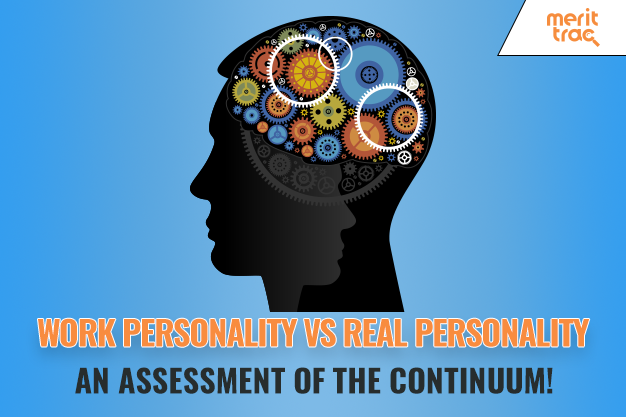
Work Personality vs Real Personality- An Assessment of the Continuum!
Date: 04/07/2019 | Posted by: Meghana Jitendra | Category: Corporate , Personality Assessment
In psychology, personality refers to the unique and relatively permanent characteristic pattern of behaviours and traits that influence how a person interacts and responds to his/her environment. That would be the 'real' personality, as opposed to one's 'work personality', which, simply put, is the characteristic pattern of behaviours and traits that influence how a person interacts and responds to his/her work environment.
Work Personality vs Real Personality
Are work and real personalities different? Not necessarily. Work personality and real personality can be seen as lying on a continuum of personality traits. These personalities may even be the different facets of a trait or a set of traits, as personality traits are expressed differently in different situations. For example, an extrovert may exhibit leadership behaviours at work, but be very agreeable (and not take the lead) in a peer group. While both are characteristics of sociability, these behaviours are different, but suitable to their respective contexts.
An individual’s response to the environment is not determined by their personality alone, but also the context. 'Work' has a different culture, and this culture influences how and what traits are manifested. Some kinds of behaviours are encouraged in the workplace, such as competitiveness, and corresponding personality traits may become more manifest in such a cultural setting. Appropriateness of behaviours in the context is also why work personality differs from our real personality.
Work Personality
One's job role influences the personality traits that are allowed to surface. For example, a finance executive, with high conscientiousness as well as extroversion, may express the former trait and corresponding behaviours more frequently in her job, but may not have the opportunity to express sociability, because the job role may not really require that trait to be expressed.
Work personality may also be moulded by mirroring behaviours and vicarious (observational) learning. We see some behaviours of other people as achieving intended results and tend to learn and mirror those behaviours (both consciously and unconsciously), which reflects on how and which of our personality traits are expressed.
Real Personality
It is noted that organizations that are inclusive of different personality types have happier employees, yet there are employees who tend to cover up their personalities in both inclusive and non-inclusive organizations. It is human nature to adapt and cope as situations change, be it at work or at home. Not revealing various aspects of personality can be seen as a way to get along with coworkers and to fit in the work environment.
While a few people are able to adapt themselves with ease, some find it to be extremely stressful when they can’t be themselves. This is why it is crucial to assess culture fit before hiring candidates as it can benefit both the employees and organizations. Employees should not adapt a work personality out of pressure but must feel the need to improve or better themselves. This kind of positive reinforcement can help both employees and the organizations to move toward a positive growth path. Organizations can help employees to be their real selves by introducing training programs that can help them be their real self. For the training programs to be effective, the employees must undergo a personality evaluation test.
Evaluation of Personality
Personality evaluation usually involves interpreting and scoring various traits. Evaluation of personality in recruitment helps to accurately predict behavioural patterns that may arise in a variety of work situations. Recruiters can make use of real personality tests to better understand the characteristics of a job applicant or an employee. Psychometricians and subject matter experts have created highly accurate personality tests that help to compare a job applicant’s work personality vs. home personality and also their online personality vs. real personality.
Personality Test
If work personality is indeed distinct from one's real personality, are personality tests for screening and selection even effective? Yes, they are. The utility of personality tests (standardized ones, not those Facebook or BuzzFeed quizzes) can't be stressed upon enough, because good personality tests bring out one's real personality traits and can map matching work behaviours.
Top organizations around the world use psychometric tests to assess the personality of job applicants. It is proven that these tests provide accurate behavioural analysis, which is crucial for making better recruitment decisions and avoiding miss-hires.
The most popular personality assessment tools include the Big 5 personality theory, Dimension 8, Generic Personality Questionnaire, and Leadership Styles Questionnaire. The format of these scientific tests helps to identify the real personality of candidates compared to the projected work personality.
These tests come in handy to analyze behavioural traits of entry-level candidates that make them employable. It also measures crucial factors such as extraversion, emotional stability, etc., that are expected from experienced candidates. The test is also used as part of post recruitment development to analyze if any employee is facing stressful situations at work and the factors that are stopping them from bringing their real personality to work.
Personality Continuum Scale
Every organization is made of people with different personalities, and these personalities can be broadly classified into introverts, extroverts, and ambiverts. Through general observation, it is noted that introverts are less outgoing and shy compared to extroverts who are more sociable and expressive. An ambivert is identified as a person with a balance of introvert and extrovert qualities. A personality continuum scale marks introvert, ambivert, and extrovert. The introvert and extrovert percentages range from 25 to 50 and more. The ambivert is shown balanced at the centre of the scale.
The use of the personality continuum scale test in recruitment is significant. It not only helps to ascertain if a candidate is an introvert or extrovert but also helps to analyze and whether these qualities make them capable of doing a job that is required of them.
Conclusion
Aren't all of us trying to make a good impression at work? We are clearly being evaluated for what we do and achieve, and with tangible consequences, which is not always the case in our lives outside work. We are careful about what personality traits we exhibit at work, how and to what degree.
So, can work personality be faked? Well, impression management does take place, but personality is 'relatively permanent', remember? Prolonged 'faking' of personality traits can lead to cognitive dissonance and emotional labour, and may eventually result in psychological distress. So, no, it's not ideal to fake one's work personality (and also not always possible!).
Recruiters should seek to match candidates' real personality traits to the behavioural requirements of the job, especially in attempt to reduce dissonance, because, work engagement and mental health of an employee in the long run are as important as selecting the right candidate for that urgent job opening, aren't they?
Matching only cognitive skills to the job role is not enough; personality goes a long way in getting the 'perfect match' between the person and the job. What good can an intelligent salesperson do if her introversion dissuades her from developing and maintaining good customer relationships?
That being said, understanding personality doesn't end with personality testing; it begins there. Personality and other behavioural test results should be taken in context, and interpretation and the resultant decisions should be supported by data from other sources such as interviews and past records of performance. Because, "in god we trust; all others must show data", even 'work personalities'.

Personality test reveals information about a candidate’s social traits, motivations, strengths and weaknesses and attitudes.
These factors play an important role in determining the kinds of job roles that will match the individual’s personality.
Handpicked Articles for Futher Reading
Relevant Case Studies/Whitepapers:













 Sales Hotline: USA: +1 646 916 0939 / Others: +91 80619 14700
Sales Hotline: USA: +1 646 916 0939 / Others: +91 80619 14700


